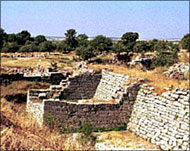Film to revive glory of Troy
On the shores of the northern Aegean, many Turks are hoping that a movie about a war fought 3500 years ago will inspire a new invasion – this time of tourists rather than ironclad warriors.

In May, Warner Bros will be releasing its blockbuster Troy, with an all-star cast including Brad Pitt, Orlando Bloom, Peter O’Toole and Sean Bean.
Publicised as an action adventure, the film will be a Hollywood version of Homer’s Iliad.
And perhaps rather optimistically, Turks in the town of Canakkale, the nearest city to the site of ancient Troy, have been campaigning to have the premier of the movie, bright lights, shining stars and all, held there.
Hanife Araz, a tour operator in Canakkale and one of those seeking to have the movie’s launch held in the town, sees the film as being a draw for the whole country.
“The Troy movie presents a great opportunity to promote Canakkale and Turkey,” he says. “The question of the premier was brought up with Warner Bros and the Culture Ministry. However, it is not important whether it happens here or not. Just the movie being made will have an effect.”
Correcting perceptions
A problem that Turkey has always had with the legend of Troy is that few know the site of the ancient city is in Turkey, as many associate it with Greece.
|
“Troy has always been known as a Greek culture; we try to show that Troy also belongs to Turkish culture” Ekram Tufan, |
It is the same with the seven churches of Asia of biblical fame, all of which are within the borders of modern Turkey.
For associate professor Ekram Tufan, there is a struggle to show a direct link between the ancient civilisations and present day Turkey.
“Our main objective is to show that Troy is our own culture and stress the importance. Troy has always been known as a Greek culture; we try to show that Troy also belongs to Turkish culture.”
While hoping that this battle will be won, at least in some small part, with the release of the movie, Turkey has been fighting another Trojan war, a battle on two fronts, for many years.
Damage and smuggling
The original excavator of the site in western Turkey, the German Heinrich Schliemann, apart from causing untold damage to the ruins with his haphazard methods, smuggled most of his finds out of Ottoman Turkey over a period of 15 years in the late 19th century.
 |
|
Heinrich Schliemann’s wife Sophia |
Among these was what the amateur archaeologist described as the treasure of King Priam, the ruler of Troy at the time of the legendary 10-year siege. The collection of jewellery, which Schliemann liked to bedeck his young Greek wife with, was later displayed with other finds in a Berlin museum.
In 1945, the Trojan hoard, along with much else, disappeared from Berlin with the entry of the Russian army, not to resurface for more than 50 years.
It was not until 1998 that Moscow admitted that its Soviet predecessor had looted the Berlin museum which had housed the collection, and then stored it in St Petersburg.
Russian show
Having admitted guilt, the Russians then flaunted it by putting the Trojan artefacts on display in Moscow’s Pushkin museum, where they remain despite repeated requests from Ankara for their return.
 |
|
The original ruined walls of |
Former Russian President Boris Yeltsin, late in his term of office and possibly when worse for wear, actually agreed to restore the treasure trove to Turkey, only for the Russian parliament to denounce the proposal.
At the same time, the Duma dismissed calls from Germany that Schliemann’s finds come back to the land of his birth, if not that of the hoard’s origin.
Gila Benmayor, a Turkish journalist who has campaigned to have the Trojan hoard returned, is just one of many who feel strongly on the subject.
“The Trojan treasure belongs neither to Russia or Germany,” she said. “The asset is ours; they cannot share it between themselves. We should reclaim the Trojan treasure and build the museum to house it.”
Museum solution
A strategy Turkey has to recover the Trojan jewels and the other pieces still in Germany, and one backed by Professor Manfred Korfmann, in charge of the present excavation work at Troy, is for the construction of a modern museum on the site of the excavation, a case of build it and it will come.
A number of overseas institutions, perhaps most notably the British Museum in London, have refused to consider returning ancient artworks either looted or acquired legally during the time of the Ottomans, due to the lack of suitable facilities in Turkey.
Even without Schliemann’s treasure, what with recent digs unearthing significant finds, Turkey has long recognised the need for a centralised repository for its Troy collection.
However, the plans for the new museum were shelved in 2001 when the economy nose-dived.
Now, with Brad Pitt’s Achilles again flexing his muscles and Helen once again launching a thousand ships, the museum is back on the drawing board, as many Turks hope that this time, some of those ships will be carrying tourists.